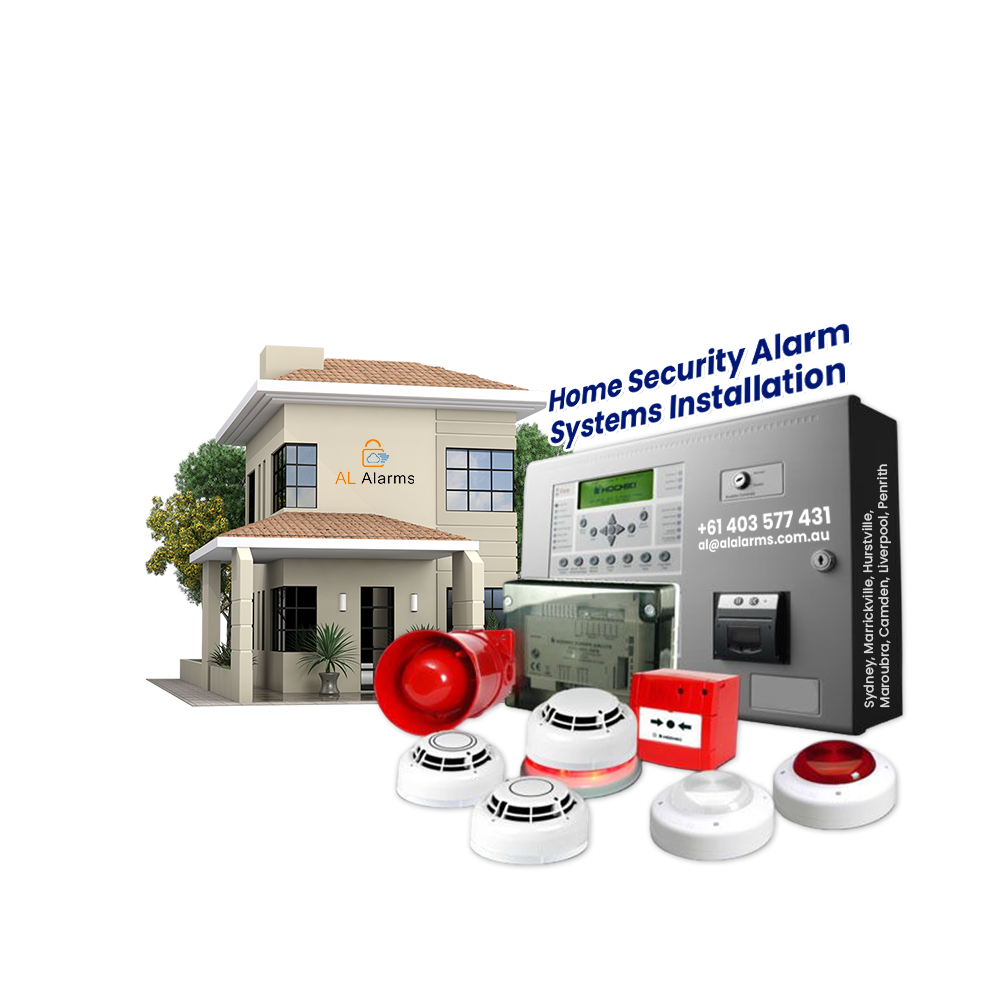Installing Home Security Alarms as a comprehensive security strategy for your assets and loved ones is a great idea. You can enjoy every restful night’s sleep when you know that your home and everything inside it has been safe and secure. Easily, you can ensure an advanced level of security even when you are not at home.
Before hiring service professionals for Home Security Alarm Systems Installation in Sydney, Marrickville, Hurstville, Maroubra, Camden, Liverpool, and Penrith, you need to have a comprehensive insight into the matter. This blog will give you all the necessary details, continue reading.
Benefits of Having a Home Security Alarm Systems Installation :-
Having a home alarm system can provide a wide range of benefits for your household. Here are the top 10 benefits of having an alarm system for your home :
(1) Security :
The greatest benefit of having an alarm system is the added security it provides to deter burglars and vandals from intruding your home.
(2) Protection of assets :
To protect your assets, such as electronics, jewellery, and other valuable items, it gives the alert in time.
(3) Early detection :
An alarm system can detect potential hazards early on, such as a gas leak or fire. This can help prevent disasters from occurring.
(4) Monitoring :
Some alarm systems come with incident monitoring capabilities, allowing you to monitor your home remotely. It’s great when you are away on vacation or at work.
(5) Cost Saving :
You can minimise damage, and reduce insurance costs for your home in the long run.
(6) Smart home integration :
Many alarm systems can be integrated with smart home network devices, allowing you to control via a Smartphone.
(7) Family safety :
An alarm system can also promote family safety by alerting authorities during an emergency, such as fire mishap or medical emergency.
(8) Peace of mind :
Having an alarm system can give your family the ultimate peace of mind, knowing that you are safeguarded against potential threats.
(9) Insurance discounts :
Many insurance companies offer discounts for homeowners for having an alarm system
How do Home Security Alarm Systems work ?
Here’s a quick look at how alarm systems work . Alarm systems rely on strategically placed sensors throughout your home or business.
Sensors |
(i) Door & Window Entry :
Magnetic contact sensors are usually placed on doors and windows to identify unauthorised openings.
(ii) Smoke and Carbon Monoxide Detection :
Many alarm systems integrate smoke and CO detectors, providing an extra layer of protection against fire and environmental hazards .
(iii) Motion Detection :
Motion sensors utilise infrared technology to identify movement within the alarm if someone intrudes.
(iv) Glass Breakage :
Glass break sensors can efficiently detect the specific frequencies related with breaking glass.
Central Control Panel |
(I) The Central Control Panel acts as the brain of the system :
(a) It collects the information from the sensors when transmitted
(b) This panel interprets the signal levels
(c) It then triggers the alarm siren for the undesired occurrence
(d) It also initiates other pre-programmed actions in case of a security breach
Different notification devices |
(i) Bells
(ii) Strobes
(iii) Horns
(iv) Chimes
(v) Siren
(vi) Hooter
For an unauthorised entry or a triggered sensor, the alarm system enables a loud siren to deter intruders and alert occupants. After that, emergency personnel like security guards or the police take the next step depending on the situation.
Different types of Home Security Alarms :-
It is important to choose the right alarm system that fits your particular needs of the household.
These three are the main three categories of the :
(i) Burglar Alarm
(ii) Fire/ Smoke Alarm
(iii) Wireless Alarm
What is the Burglar Alarm System ?
If a burglar alarm is triggered, the sirens and strobe lights alert you as well as the whole neighbourhood.
To protect your business you need to consider the Commercial Burglar Alarms in West Mead, Lidcombe, Picton, Kings Wood, Kings Grove, Marrickville, and Botany .
What are Burglar Alarm System Components ?
(i) System Interruption Sensors
(ii) Motion Detectors
(iii) Glass Break Detectors
(iv) Door and Window Contacts
(v) Alarm Keypad
(vi) Dedicated Alarm Control Panel
What is a Fire/ Smoke Alarm system ?
A Fire/ Smoke alarm system is designed to alert the residents and call for emergency forces when there is fire, smoke, CO, H2S and other toxic, poisonous gases.
What are Fire/ Smoke Alarm System Components ?
(a) Fire alarm control panel
(b) Smoke detectors: optical, photoelectric and ionic
(c) Temperature detectors: thermal and thermovelocimetric
(d) Flame detectors: infrared, ultraviolet and combined IR+UV
(e) Linear infrared detectors
(f) Gas detectors
(g) Detector cable or temperature sensor for fires.
(h) Notification devices
(i) Primary power supply
(j) Backup power supply
What is a Wireless Alarm System ?
Wireless alarm systems function by transmitting data through your existing Wi-Fi network, removing any need for any structural modifications or extensive wiring.
What are the benefits of a wireless house alarm over a wired alarm ?
There are several benefits to having a wireless house alarm over a wired alarm, including :
(i) Easy to expand :
Wireless alarms can be easily expanded by adding additional sensors or devices, without the need for additional wiring.
(ii) Easier installation :
Wireless alarms are much easier to install than wired alarms, since they don’t need any drilling or running of cables through walls, which can be time-consuming and disruptive.
(iii) Portable :
Without the need for any rewiring, wireless alarms can effortlessly be moved to a new place in your home or a new location if you move house,
(iv) Flexible placement :
Wireless alarms can be placed in any expedient location, as they do not need to be placed near a power supply source or connected via cables.
(v) More reliable :
Wireless alarms are usually more reliable than wired alarms, as they are not affected by cable damage or power outages.
When to choose Home Security Alarms over CCTV Cameras ?
Unlike CCTV cameras that provide continuous visual monitoring, alarm systems are a deterrent and an immediate alert system.
Home Security Alarm strengths be considered :
(i) Instant deterrence :
A loud alarm can scare off the intruders and alert people nearby, potentially preventing a break-in instantly.
(ii) Instant security contact :
Automatically, the monitored alarms can contact the police or a security company with a prompt response.
(iii) Affordable :
Home secutiry alarm systems can fairly be inexpensive, particularly compared to CCTV systems.
CCTV Camera Weaknesses to be considered :–
(i) Don’t prevent entry :
Like burglar alarms, CCTVs only record the incidence after a break-in has taken place. They can’t prevent entry.
(ii) Privacy concerns :
Not all personal things should be under surveillance. Some people may be worried about the privacy concerns for having CCTV cameras on their property.
(iii) More expensive :
CCTV systems can be more expensive than burglar alarms, particularly when you want a high-quality system with remote monitoring.
Along with the installation of those alarms, when you ensure the Home Automation system is installed in your home, you will be able to escalate the security to the next level.
What is Home Automation Installation ?
When you use the intruder alarm system for your home, you can make it more user-friendly with the help of HOME AUTOMATION INSTALLATION in Blacktown, Burwood, Picnic Point, Homebush, Castle Hill, Mona Vale, Bankstown.
The system will smartly detect if the door gets opened without the owner’s permission and then it will send a notification to your Smartphone or Notebook.
What are the benefits of Home Automation Installation ?
A range of benefits are offered to enhance your comfort and convenience through the installation of Home Automation :
(i) Seamless Interconnectivity
(ii) Remote Control and Convenience
(iii) Real-time Monitoring
(iv) Personalized Comfort and Care
(v) Increased Security Control
(vi) Increased Convenience and Automation
(vii) Improved Health and Well-being
(viii) Enhanced Entertainment and Personalized Experiences
(ix) Enhanced Energy Efficiency
(x) Disaster Preparedness and Peace of Mind
(xi) Better Energy Efficiency and Cost Savings
The Conclusion :
As per your need, you must choose the right Home Alarm System to be installed. Next, you need one of the most reliable service providers AL Alarms. Also, they have popular alarm repairing services which makes them a complete alarm solution provider near you.
Contact them soon and also try their Wireless 4K VIDEO Camera Repair in Sydney, Marrickville, Hurstville, Maroubra, Camden, Liverpool, and Penrith . Have a secure life ahead.




